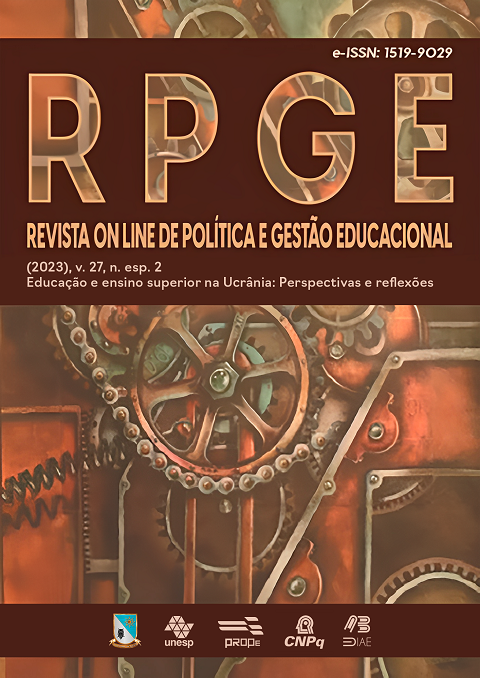O ensino superior biológico moderno em contexto de guerra
Discurso teórico e prático (experiência ucraniana)
DOI:
https://doi.org/10.22633/rpge.v27iesp.2.18389Palavras-chave:
Ensino superior biológico, Guerra russo-ucraniana, Transformações, Experiência práticaResumo
O objetivo do artigo é analisar o discurso teórico e prático da educação biológica superior nas condições de hostilidades e agressão militar russa. Métodos de análise e síntese, abstração e comparação foram utilizados para esse estudo. Nos resultados, a experiência ucraniana de organizar o ensino superior biológico durante a lei marcial, a formação de oportunidades de desenvolvimento adicional usando a experiência obtida e o potencial de integração europeia são atualizados. Salientam-se os principais riscos na via do desenvolvimento do ensino superior de biologia e as perspectivas de melhoria da situação geral. Em particular, os desafios militares permitiram desenvolver o ensino de biologia no nível superior. Nas conclusões, mostra-se que a regeneração do campo da educação é possível no contexto da restauração do sistema administrativo em geral.
Downloads
Referências
AMBARWATI, R.; FAIZAH, U.; RAHAYU, D. A. Enhancing the digital literacy of pre-service biology teacher through animal systematics course. In: PROCEEDINGS OF THE MATHEMATICS, INFORMATICS, SCIENCE, AND EDUCATION INTERNATIONAL CONFERENCE, 2019, Surabaya, Indonesia. Proceedings [...]. Paris, France: Atlantis Press, 2019. ISBN 9789462528741. DOI: 10.2991/miseic-19.2019.46.
BAKHMAT, N. et al. Modernization of future teachers' professional training: on the role of immersive technologies. Futurity Education, v. 2, n. 1, p. 28-37, 2022. DOI: 10.57125/fed/2022.10.11.22.
CHANKSELIANI, M.; QORABOYEV, I.; GIMRANOVA, D. Higher education contributing to local, national, and global development: new empirical and conceptual insights. Higher Education, v. 81, n. 1, p. 109-127, 2020. DOI: 10.1007/s10734-020-00565-8.
CHANKSELIANI, M.; QORABOYEV, I.; GIMRANOVA, D. Higher education contributing to local, national, and global development: new empirical and conceptual insights. Higher Education, v. 81, n. 1, p. 109-127, 2020. DOI: 10.1007/s10734-020-00565-8.
CHRÁSKOVÁ, M.; CHRÁSKA, M. Availability of implementation of standards of digital competence of secondary education teachers. Futurity Education, v. 1, n. 1, p. 32–40, 2021. DOI: 10.57125/FED.2022.10.11.4.
DHAWAN, S. Online learning: A panacea in the time of COVID-19 crisis. Journal of Educational Technology Systems, v. 49, n. 1, p. 5-22, 2020. DOI: 10.1177/0047239520934018.
HUANG, R.; SPECTOR, M.; YANG, J. Educational technology: a primer for the 21st century. [S. l.]: Springer, 2019. 248 p. ISBN 9789811366420.
JANDRIĆ, P. Biology, information, society. Postdigital Science and Education, v. 3, n. 2, p. 261-265, 2021. DOI: 10.1007/s42438-021-00220-0.
JANDRIĆ, P. Biology, information, society. Postdigital Science and Education, v. 3, n. 2, p. 261-265, 2021. DOI: 10.1007/s42438-021-00220-0.
JENA, B.; GUPTA,S.; MISHRA, N. Effectiveness of online learning and face-to-face teaching pedagogy. In: JENA, B. M.; GUPTA, S. L.; MISHRA, N. Transforming higher education through digitalization. Boca Raton: CRC Press, 2021. p. 21-43. DOI: 10.1201/9781003132097-2.
KUBITSKYI, S. et al. Management of pedagogical and sports educational institutions in Ukraine. SPORT TK-Revista EuroAmericana de Ciencias del Deporte, v. 11, p. 19, 2022. DOI: 10.6018/sportk.538991.
LOBACH, N.; SAENKO, M.; ISYCHKO, L. Disadvantages and advantages of implementing distance learning in higher institutions of medical education. Viae Educationis. Studies of Education and Didactics, v. 1, n. 3, p. 13-18, 2022. DOI: 10.15804/ve.2022.03.01.
METCALF, L.; BERNACKI, M.; BERNACKI, L. How do digital textbook platforms promote active learning in undergraduate biology courses? Journal of Research in Science Teaching, DOI: 10.1002/tea.21845.
NAPAL FRAILE, M. et al. Digital narratives for biology learning. In: NAPAL FRAILE, M. et al. Contributions from biology education research. Cham: Springer International Publishing, 2022. p. 87-98. DOI: 10.1007/978-3-030-89480-1_7.
NEHM, R. Biology education research: building integrative frameworks for teaching and learning about living systems. Disciplinary and Interdisciplinary Science Education Research, v. 1, n. 1, 2019. DOI: 10.1186/s43031-019-0017-6.
NOURZAIE, H.; MOHAMMED, T.; BATT, M. Digital learning: the future of medical education? The Clinical Teacher, v. 15, n. 4, p. 353, 2018. DOI: 10.1111/tct.12810.
OLIVEIRA, A. et al. Emerging technologies as pedagogical tools for teaching and learning science: a literature review. Human Behavior and Emerging Technologies, v. 1, n. 2, p. 149-160, 2019. DOI: 10.1002/hbe2.141.
RAJAB, K. The effectiveness and potential of e-learning in war zones: an empirical comparison of face-to-face and online education in Saudi Arabia. IEEE Access, v. 6, p. 6783-6794, 2018. DOI: 10.1109/access.2018.2800164.
RAKHIMOV, T.; MUKHAMEDIEV, M. Peculiarities of the implementation of the principles of the education of the future analysis of the main dilemmas. Futurity Education, v. 2, n. 3, p. 4–13, 2022. DOI: 10.57125/FED/2022.10.11.29.
WILLIAMSON, B. New digital laboratories of experimental knowledge production: artificial intelligence and education research. London Review of Education, v. 18, n. 2, 2020. DOI: 10.14324/lre.18.2.05.
WOJCIECH, W. et al. Future educator's digital learning assets: global challenges of our time. Futurity Education, v. 1, n. 2, p. 32-41, 2021. DOI: 10.57125/fed/2022.10.11.17.
ŽUPANEC, V.; LAZAREVIĆ, T.; PRIBIĆEVIĆ, T. Classes supported by digital technologies: the application of the blog as a virtual tool in biology teaching. Inovacije u nastavi, v. 35, n. 3, p. 120-133, 2022. DOI: 10.5937/inovacije2203120z.
Publicado
Como Citar
Edição
Seção
Licença
Copyright (c) 2023 Revista on line de Política e Gestão Educacional

Este trabalho está licenciado sob uma licença Creative Commons Attribution-NonCommercial-ShareAlike 4.0 International License.
Manuscritos aceitos e publicados são de propriedade da Revista on line de Política e Gestão Educacional. É vedada a submissão integral ou parcial do manuscrito a qualquer outro periódico. A responsabilidade do conteúdo dos artigos é exclusiva dos autores. É vedada a tradução para outro idioma sem a autorização escrita do Editor ouvida a Comissão Editorial Científica.











